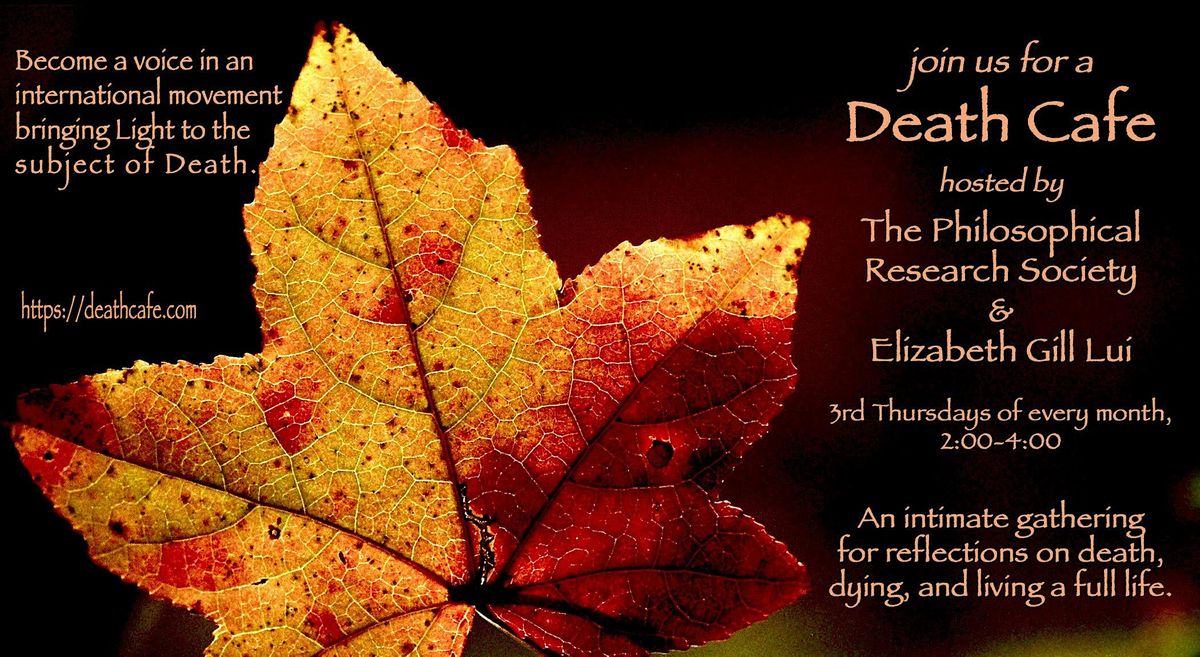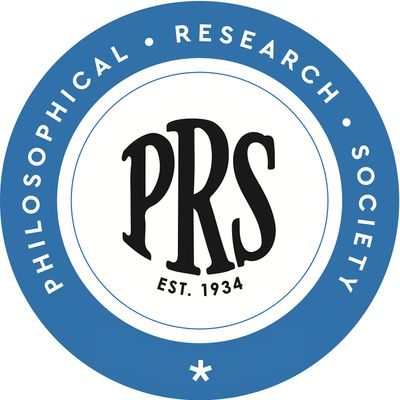
About this Event
The DEATH CAFE, hosted by Elizabeth Gill Lui and The Philosophical Research Society, is a regular gathering of small groups interested in sharing in discussions about all things related to death and dying held on the third Thursday of each month. The focus will be open-ended and will follow whatever direction a spontaneous conversation may lead. It is informal, without expectation, and open to all.
The Death Cafe will also bring lightness to the gathering by serving tea and refreshments.
Admission is free of charge but there is a suggested donation of $10 towards the nonprofit Philosophical Research Society.
About the host:
Elizabeth Gill Lui is a fine art photographer, published author, and educator. With a degree in comparative religion from Colorado College, she pursued graduate work in American Indian Studies at the University of Denver, and Transformational Psychology at the University of Philosophical Research. She received certification as a Death Doula in March 2022 from the International Association of Professional Career College.
She has been a distinguished visiting artist at schools in the US and Asia, and the recipient of grants from the Ford Foundation, and the Graham Foundation and the Rockefeller Fund.
Her books have looked at the cultural significance of architecture and the built environment as humanizing aesthetic forces, while promoting the need for architectural literacy. Her fine art work in photography expands that focus to consider the unity of consciousness and nature, the fractal patterns present in the organic world, and the profound connections that unite us all. Further information can be found at: elizabethlui.com
About The Death Cafe:
The Death Cafe is part of a growing international movement of people who desire to reevaluate and transform our cultural relationship to death. Since September 2011, Death Cafes have spread quickly across Europe, North America, Australia and Asia. As of today, there are 14,409 Death Cafes in 81 countries. It includes many people who are committed to a healthier approach to dying, death and burial, including green burials and alternatives to the problematic practices of the traditional funeral industry.
Additional information on Death Cafe's origins and its founder can be found at: deathcafe.com.
Finding Life at The Death Cafe by Elizabeth Gill Lui
If you are reading this, that means that you are not too late to the conversation—the conversation about Death. And it is not too soon to join in. Growing concerns in our culture point to the perpetual state of denial we live in as it relates to Death, and our blinding inability to be moved by its distortion effect on our psyches. Those effects not only dehumanize us, but force death to rear its ugly head in the least desirable of places, remaining unchecked. So pervasive is death, we seek protection by numbing ourselves to its immediacy. From the macro to the micro, it is not surprising that we can hardly attend to our personal experiences of death with any sense of forethought or intimacy.
During Covid, Americans exhibited a shocking lack of unanimity finding common cause against a virus that would K*ll over a million of our fellow citizens, and over 6 million fellow humans worldwide. We also continue to find it difficult to register that over 150 species go extinct every 24 hours(1). Or, as one author has noted (2), the planet is on life support, and at best is in the last stage of hospice when all that remains possible is ‘care, not cure.’ We remain numb in making sense of the escalating violence in our society fueled by guns on a rampage in our schools and supermarkets, or to the fact that the suicide rate in the US is double its homicides.
Over the last two years while witnessing amplified issues surrounding mortality, I pursued several things, all of which in one way or another had to do with confronting my life’s finite timeline. As an aging human, I entered my seventh decade. As a philosopher I read and thought, continually questioning why we are the way we are, with an answer eluding me still. As an artist I spent many months working on my archives, placing them in the capable hands of museums and libraries. As a mother and grandmother, I spent precious time with my family. As an environmentalist, I became one of over 40K climate activists in Al Gore’s Climate Reality Leadership Project, and then, with some more time on my hands, and continuing to weigh the inevitable, I became certified as a Death Doula.
Many people are familiar with the role of midwives and birth doulas at the bedside of newborns, but I have found not as many know about the practice of Death Doulas in the world of palliative and hospice care for the dying.
As expressed poignantly by INELDA, the International End-of-Life Doula Association—It’s time to care for the dying and those close to them with compassionate engagement and open-hearted presence. It’s time to remember and incorporate the traditions of our ancestors, the inner healing and beauty that can be experienced between people surrounding the dying person. It’s time for us to embrace ‘a more enlightened’ approach to care.(3)
Like Birth, Death is not a medical event. Dying often is, but Death is not. Both are definitively human and provide the bookends to our lives. As the movement in conscious dying has evolved into what is now termed the Death-Positive movement, many are advocating for supportive ways we can shepherd the dying through the universal experience of what is, one’s final living act. Central to this awareness is that we need more openness in discussing loss, death, and grief, and in that unfolding conversation, our culture might begin to find compassionate ways to approach the inevitability of this life event. For individuals, the hope is to provide a better way of planning for, and accepting, our own deaths. And in helping friends and family navigate the options for end-of-life care, more openness will benefit both the caregivers and the dying.
While reading and studying about death and dying I valued discovering concrete resources for things that we all glimpse in our peripheral vision, but avoid attending to: Living Wills, Advance Care Directives, DNR orders, Medical-Assisted-Aid-in-Dying legislation and resources, and newly developed green burial options including Human Composting (NOR) and Aquamation.
Pragmatic all, once on this path, you inevitably also come across The Death Cafe (4). The Death Cafe model was developed in Britain by Jon Underwood and Sue Barsky Reid, based on the ideas of French sociologist Bernard Crettaz, with ‘the objective to increase awareness of death with a view to helping people make the most of their (finite) lives.’ Begun in 2010, Jon launched a project that by 2022 would reach over 140,000 people in over eighty countries. At a Death Cafe people, often strangers, gather to eat cake, drink tea, and discuss death. So simple, yet responding to a deep cultural longing, the level of participation in this transformative communal experiment speaks volumes.
As I continued to navigate the subject of death, while trying to live more fully, I approached PRS with the hope of co-hosting a Death Cafe for our community. Our first Cafe was held on 9.15, and will continue monthly, providing safe space for the emotional power of compelling stories, while raising awareness and inspiring action around death, dying, and conscious living.
My instinct tells me that if we pay more attention to death, perhaps extend our hands out with the possibility of befriending death, we will embrace it in its life-affirming fullness and natural beauty. At The Death Cafe in September, we found a beginning by personalizing our reasons for attending. I hope you will join us at a future Death Cafe as we further that conversation, and shine light on death, enriching our lives in the process.
1 Scientists estimate that 150-200 species of plant, insect, bird, and mammal become extinct
every 24 hours, up to 10,000 times higher than the natural extinction rate.
2 William DeBuys. The Trail to Kanjaroba. Seven Stories Press, New York 2022.
3 International End-of-Life Doula Association https://inelda.org
4 Death Café https://deathcafe.com
COVID-19 Protocols for the Philosophical Research Society
- To ensure safety for visitors and staff, PRS has implemented the following measures:
- Please stay home if you are feeling sick. Check the CDC website for coronavirus symptoms.
- Please do not visit if you come in close contact with someone who has COVID-19 or COVID-19 symptoms in the 14 days prior to your visit.
- Face masks are strongly recommended to all visitors and staff indoors. See LA County recommendations.
- Please use the outdoor courtyard when eating or drinking.
- Capacity is limited for the purposes of safety.
- Hand sanitizer stations are available throughout the campus.
- All visitors must follow the posted rules.
More information:
Los Angeles County: https://covid19.lacounty.gov
Los Angeles City: https://coronavirus.lacity.org
http://publichealth.lacounty.gov/media/Coronavirus/docs/HOO/HOO_SaferReturnWorkCommunity.pdf
An inherent risk of exposure to COVID-19 exists in any public space where people are present. We cannot guarantee you will not be exposed to COVID-19 during your visit. Those visiting the Philosophical Research Society, Inc. do so at their own risk of such exposure.
PRS EVENT POLICIES
- We reserve the right to refuse service to anyone.
- Events are subject to change without notice, including guest speakers and/or performers.
- We encourage you to arrive at least 30 min. before the scheduled event start time to find parking, enjoy the Bookstore and take your seats.
- Please turn off all mobile devices before the show. Talking and texting are not allowed during the events.
- No filming, audio recording or mobile phone recording of events, screenings, concerts or other programs by audience members is allowed.
- There is no smoking permitted on PRS grounds.
- We strongly encourage guests to wear masks to PRS events to prevent the spread of infectious diseases.
- PRS allows Service Animals into the facility under ADA and state guidelines. For further details please visit www.ADA.gov. No animals permitted whose sole function is to provide comfort or emotional support, under ADA guidelines and CA Health Code.
- Please do not bring outside food or drink into PRS events.
- Weapons are strictly prohibited at PRS events.
REFUND POLICIES
All sales are final. There are no refunds or exchanges for PRS events, except in the event of a medical emergency, including but not limited to a positive COVID-19 test.
In the event that PRS is forced to cancel an event entirely, tickets will be refunded or vouchers offered for a rescheduled event.
Event Venue & Nearby Stays
Philosophical Research Society, 3910 Los Feliz Boulevard, Los Angeles, United States
USD 0.00
